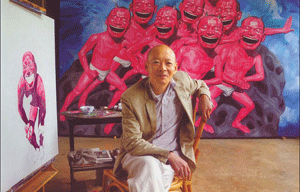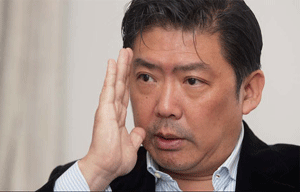Top schools recruiting best brains
Updated: 2011-10-17 07:29
By Li Yao (China Daily)
|
|||||||||
BEIJING - World-renowned universities, including the University of Oxford and the University of Cambridge, have come to China to attract top-notch postgraduate students in cooperation with the China Scholarship Council.
Oxford made its debut appearance at the China Scholarship Council's annual International Graduate Scholarship Fair, which opened on Saturday in Beijing. The school wants to encourage excellent Chinese students to consider what Oxford can offer for their academic and professional careers.
Jane Sherwood, director of graduate admissions and funding at Oxford, will make two more stops for the fair, on Oct 19 in Wuhan and on Oct 21 in Shanghai.
"The students I met showed full enthusiasm for their studies. They came well-prepared with specific questions and were serious about their research interests," Sherwood said.
Thanks to successful fundraising campaigns, Oxford can maintain its generous offer of scholarships, about 50 million pounds ($79 million) a year, to overseas students, she said.
There are about 600 Chinese students at Oxford. More than 2,500 graduates of Oxford live in China, according to a University of Oxford news release on Wednesday.
The University of Cambridge has attended the fair since its first session in 2009. There are many doctoral students on joint sponsorships provided by the China Scholarship Council and the Cambridge Overseas Trust.
Sue Osterfield, deputy director of the trust, said Cambridge has continued to invest in education and give financial support to train students to be problem-solvers.
With Cambridge and Oxford present at the fair in competition for the best and brightest, Osterfield and Sherwood agreed that the two universities usually have more interest in cooperation than rivalry, except in their traditional annual boat race.
Caroline Daley, dean of graduate studies at the University of Auckland in New Zealand, said the number of doctoral students fully sponsored by the China Scholarship Council had increased from 17 in 2009 to 34 this year.
"We did not cut scholarship funding despite financial stress, because investment in education is important for New Zealand," Daley said.
Chinese students will benefit from world-class education, gain international exposure and enjoy a good quality of life at the University of Auckland, she added.
For Monique Martinez Thomas, head of the Doctoral School of Toulouse University Research and PhD Office in France, and Reinhard Belocky from the Austrian Science Fund, it is a unique advantage to attend the fair as the sole representative of their countries.
Toulouse University has 150 Chinese doctoral students, and between 50 and 200 applicants might receive sponsorship from the China Scholarship Council this year, Thomas said.
The Austrian Science Fund attended the fair in Beijing as a first-time experiment.
"I am positively impressed and surprised. The Chinese students are very dedicated and specific about their choices. They know what they want," Belocky said.
Gregory Gray from the University of Florida encouraged applicants to find a research project related to their home countries.
Due to the economic downturn, many universities in the United States are facing financial stress and trying to keep costs down. Departments and supervisors are finding ways to offer support to students, he said.
The University of Florida has 1,200 students from China.
Among the students waiting in long lines at the booth for the University of Florida, Zhang Shuai, 21, held a copy of earlier e-mail communication with Gray.
Zhang is a senior student at China Agricultural University studying animal science. He wants to go to the US to continue his studies.
He had to wait for half an hour for his turn to make inquiries about the University of Florida, Kansas State University and the University of Nebraska Medical Center.
After talking with Gray, Zhang realized that it is important to narrow down a specific research topic and try to find potential supervisors.
Pan Yu, 21, a senior mathematics student from Nankai University in Tianjin, waited at the booth for the University of Cambridge.
Pan is mainly considering universities in the US and Great Britain. "But it has become rather difficult to apply for scholarships at US universities nowadays," she said.
Sun Yiqing, in her first year of master's degree studies at the China University of Geosciences in Beijing, plans to pursue doctoral studies on petroleum geology in the US.
She said offers of scholarships from US universities have become fewer in recent years.
"When I complete my PhD abroad, I would like to work in China. The years abroad will be beneficial to open my mind to diverse points of view."









